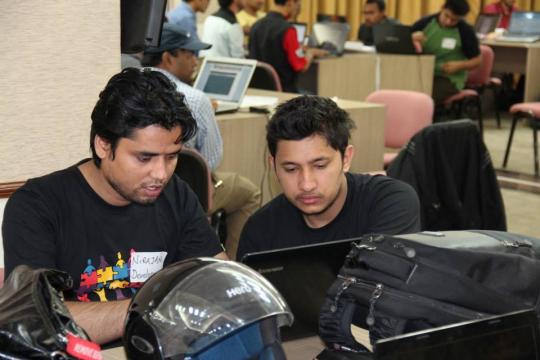
It’s June 16th, 2013. When you walk through the desolate, empty streets of Kathmandu today, where the effects of another bandh (strike) are clearly visible, you can’t help but wonder: will we Nepalis ever stand up and speak out against any of the injustices we see in our society or will we silently trudge on as always?
Sitting in a conference room at the Trade Tower in Kathmandu, I feel enormous hope that yes, we will. It’s a room filled with more than a hundred young techies and gender activists, all of whom braved the monsoon and the bandh to be a part of the Violence Against Women (VAW) Hackathon – a platform to bring together diverse stakeholders to work on technology solutions to VAW issues.
The atmosphere in the room is electrifying. Everywhere I look, I see eager, excited faces earnestly discussing solutions to complex problems, determined to help bring about change in their society.
“If we (the youth) don’t do anything about the problems in our society, then who will? If some of us start creating change, I am sure other people will be inspired to do the same,” says 22-year-old Tribhuvan Pokharel, an engineering student from Kathmandu University.
His group is working on a web app where people can report cases of VAW through email or SMS and easily find the contact details of people who could help around the place where they live. “Our app will also help keep the relevant agencies accountable, as we will be able to track if the cases have been resolved or not,” says Tribhuvan.
Sushma Thapa, 23, is another young student participating in the hackathon. Her team is working on a web discussion forum where people can talk to experts and each other about their experiences with violence and abuse, and help each other find resources and solutions.
“Change is something that happens gradually,” says Sushma. “I think it is about changing the mindset of people, so that over time people internalize these issues.”
Violence against women is a deep-rooted problem, which obviously cannot be ended through one app, or through the efforts of one organization. But this is why the hackathon is unique. It is not just about developing technology, but bringing all these people together and getting them thinking about how each of them can work with like-minded people to bring about positive change. It gives me tremendous inspiration to see such dedicated youth in my country. If the app they develop can help a woman in another part of Nepal in any way - through resources, advice, connections - that is a small way our society has changed. And that small change is all we need to start making a big difference.


Join the Conversation